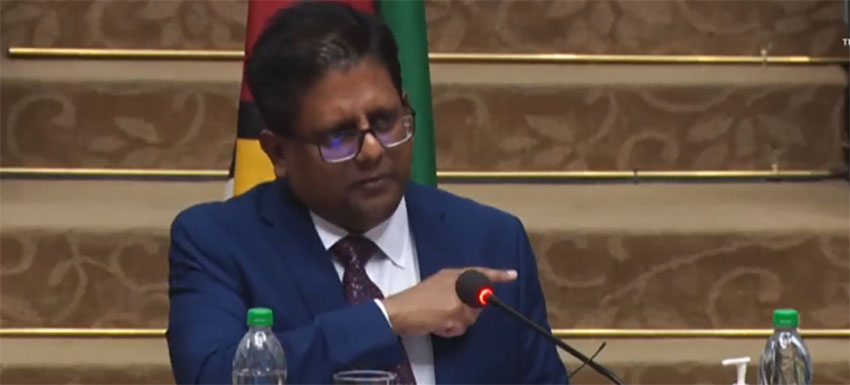If the government can, within limits, be indulged in its up tempo reportage on the country’s first trillion dollar budget allocation, it needs to be reminded that, unlike in previous years, failure to effectively deliver (partially or entirely) on promises to which monies were allocated utilizing arguments about limited funding have now become far less credible given the enormous increase in the overall budgetary allocation this year. Here it should be stated that gaps between the articulation of promises made in previous budget presentations and their eventual full, and final execution, under various political administrations, can, in many instances, be identified with relative ease.
Put differently, failure to deliver (fully or partially) on promises made in budget presentations has become altogether commonplace in the Guyana experience. Over time, several altogether unconvincing reasons have been provided for gaps between promises made in budget presentations and the failure of those to be completed. Some of these have, over time, disappeared from the ‘to do’ radar altogether. Contextually, it should be noted that the country’s 2024 ‘Trillion Dollar’ Budget commits the government to allocating around G$780 million to the replenishment of the Small Business Fund and a further $331 million for allocation to the Small Business Bureau. Here the Stabroek Business ‘picks on’ the budgetary allocations for small business development since the small business sector would appear to have a significant potential bearing on poverty alleviation and employment creation, both critical prerequisites to the overall forward movement of the country’s developmental agenda.
Two points should be made at this juncture. The first (and historical experience suggests that we can hardly avoid making this point) is the bureaucracy that almost always attends the delivery of services/resources of a material nature to would-be beneficiaries through state-created channels which are, not infrequently, characterized with bureaucracy and attendant ineffectiveness. Over time, this newspaper has made references to known pockets of frustration embedded in state-created systems/institutions designed to deliver critical services to ‘consumers’ that appear to have become corroded by obstacles/blockages that are widely believed to have been created to enable the distortion of their substantive functions. Here, it is apposite to note that stories of ‘criteria’ (outside of officially designated ones) for access to goods and services that are already fully financed by the state have become increasingly commonplace in Guyana over the years.
One might add that these blockages are, not infrequently, created as a means of providing channels for the misdirection of resources into channels that are concerned with bribes and kickbacks. Here the point should be made that unless robust and unambiguous state directives are given about clearing away what, not infrequently, are deliberate and ‘strategic’ blockages to the transparent and expeditious processing and execution of state-funded loan/grant applications (to enable the growth of the micro/small business sector) applicants are likely to eventually turn their backs on those channels, in which instances, they will be compelled to seek out more ‘costly’ options to securing financing for small business creation and growth.
Here, the point can hardly be made too strongly that the various claims that access to state-funded loans and grants are attended to by what may be described as a Mordida syndrome (a Spanish expression associated with bribes and kickbacks) and which has to be eliminated from the mindsets of small business aspirants through transparent and robustly disseminated strongly official messages to the effect that access to state-funded loans and grants is strictly criteria driven. It should be noted that of the overall 2024 budgetary allocation of $780 million assigned to small business development, $331 million falls under the jurisdiction of state agencies which, not infrequently, are attended to by ‘procedures’ that mirror conventional state bureaucracy in terms of what, not infrequently, are procedurally protracted and frustratingly ‘time-consuming.’ If real meaning is to be given to these ‘windows’ that are open to maximizing opportunities for small business growth, government needs to appreciate that systems that are saturated with tedious procedures, protracted delay in execution are unlikely to be, in practice, as enticing as they seem in a budget presentation that has been designed, in large measure, to take account of government’s own image-enhancing priorities.
Now that the 2024 Budget has been promulgated – with all of its ‘trillion-dollar huff’ – it is for government to match its carefully choreographed presentation with mechanisms designed to ensure that the undertakings outlined in the budget are fully and expeditiously delivered. Here, it must focus on two critical priorities. First, it must ensure the availability of administrative competencies for the appropriate systems are in place to optimize the expeditious and hassle-free execution of the undertakings set out in the budget presentation, particularly where those are connected to the distribution of support resources. Second, functionaries designed to oversee the execution of the resource-related undertakings set out in the budget need to be reminded that ‘improper’ disbursements will, in the final analysis, discredit the uplifting undertakings as would have attended the January 15 Budget presentation, in the first place.






